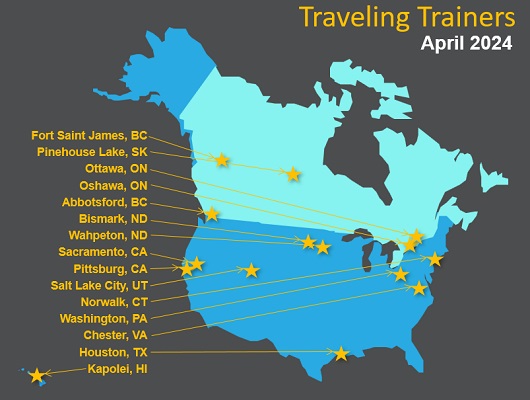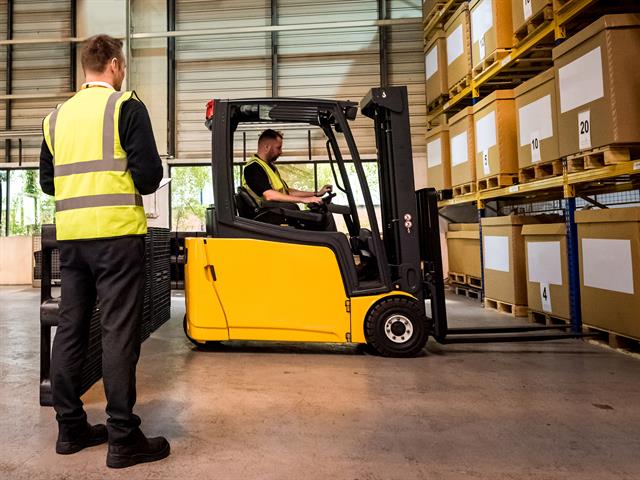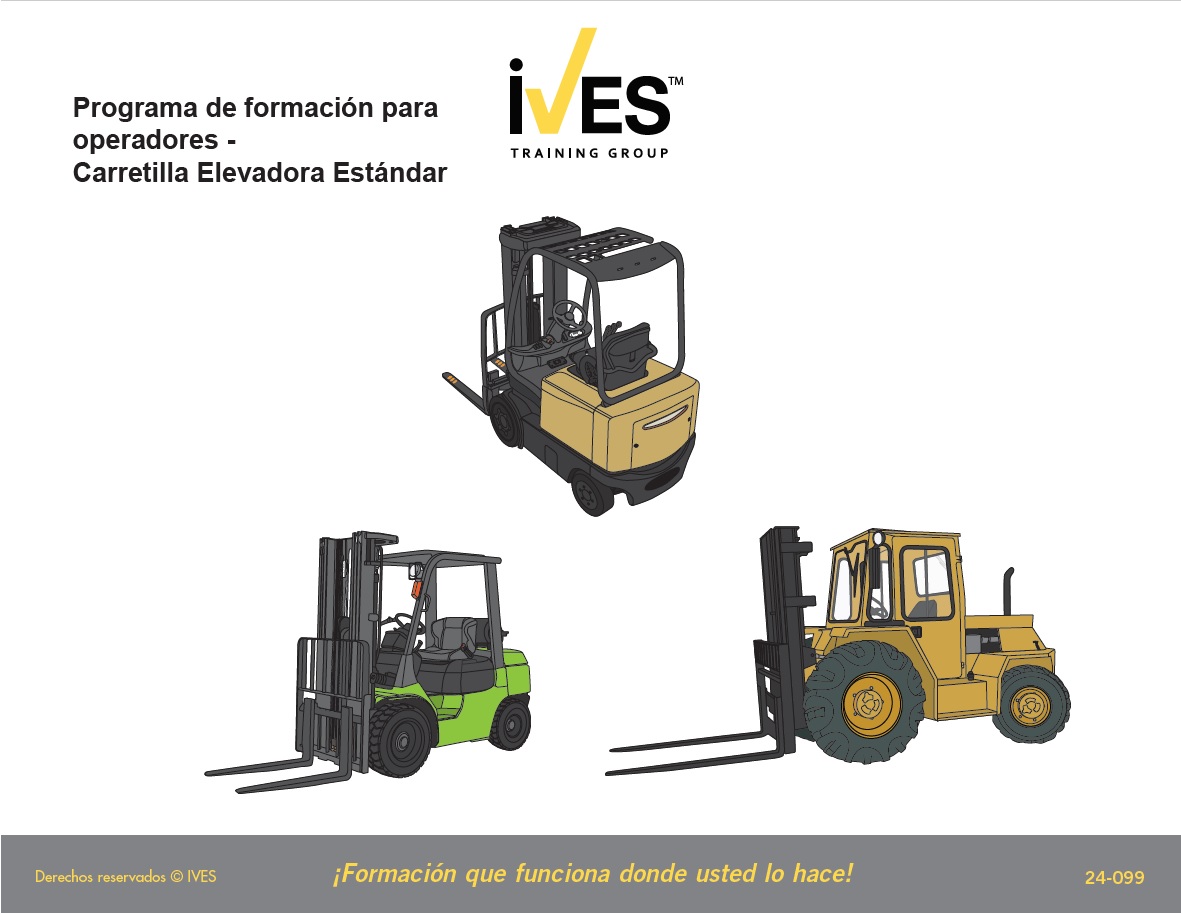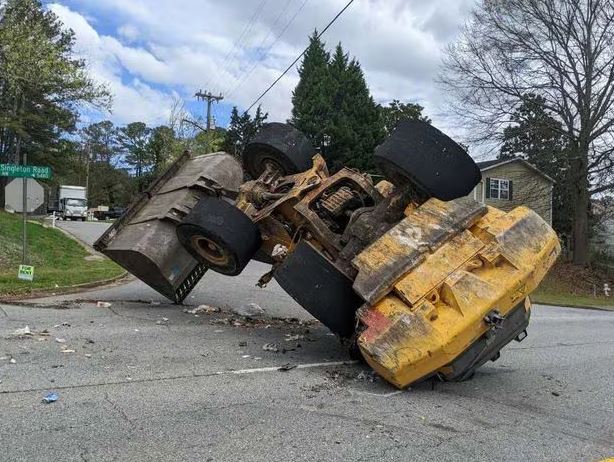
The IVES Update Newsletter is a highly informative monthly e-newsletter. It contains up-to-date industry information, regulatory updates, stories from the field, upcoming program dates, What’s Wrong With This? photos, incident reports, our interactive “Ask Bob” question and answer column, new product details and much more.
Whether you're interested in forklifts, mobile elevating work platforms, loaders or excavators – we’ve got you covered. Want to receive it directly to your inbox? Sign up for our IVES Update e-Newsletter!
Year:


In continuing the trend of launching new products in 2024, we are thrilled to announce the arrival of even more great training aids designed to help make your operator training as clear and impactful as it can be. That being said, the following new products are now available:
Video - Did You Catch That? MEWPs – Joining the Standard Forklifts edition released in February, this is the second installment in the Did You Catch That (DYCT) video series in which viewers watch operators going about their business performing tasks with the equipment to see if they can spot both correct and incorrect equipment operation. In this particular video, operators are shown using an aerial boomlift and scissor lift alternately in four separate scenarios. Viewers watch a scenario, discuss what they saw, then watch the scenario again as it repeats with narration pointing out proper and improper operator behaviors.
“I really like that people have said they like that [the videos] point out good things and not just mistakes,” said Rob Vetter, IVES Director of Training. He went on to say, “We’ve always tried to promote keeping a positive spin on training so I’m glad people have picked up that. I also really like that some trainers say they are using [the videos] during original operator training, not just recert classes.”
The DYCT videos are accessible in web browser viewing format and can be purchased individually or as a part of our Trainer or Requalification Power Packs.
Spanish Language Digital Training Aids – With the ongoing development of the equipment Operator Reference Manuals (ORMs) and the Digital Training Aids (DTAs) designed to accompany them, the need for Spanish language has emerged. With the ever-increasing amount of text in many of the DTA frames, including titles, labels, wording on decals and generally overall, we feel that by adding this language option to our DTA inventory it provides a route to better understanding and clarity for Spanish speaking trainees. At the moment, Spanish language DTAs are available for all of our forklift and MEWP materials as well as for Skid-Steer Loaders. Versions for Wheel (Front-End) Loader and Loader Backhoe are on the way along with Spanish language Power packs. Head to www.ivestraining.com now and check out all the new inventory!

Thankfully, when it comes to forklifts most reputable employers understand the need for basic novice training for new operators.
Given the size and power of these machines, it’s easy to see why this is a recognised requirement.
But what’s just as important is ensuring that any good work done in ensuring an operator understands how and why to work safely is not lost as time goes on.
Indeed, this vital instilling of best practice with regular monitoring and refresher training is where many businesses’ operational safety falls down.
It is human nature that the skills we possess will fade over time if not honed and maintained.
The consequences of this in the case of the operation of materials handling equipment, however, can be severe. If allowed to develop, bad habits and complacency can lead to costly accidents and serious injuries, putting everyone in danger.
Although unsafe operators are a risk to their own safety, with the protection of the truck’s cab and seatbelt they are not the most vulnerable if an accident occurs.
Unsafe operating practice is far more likely to put those around them at risk, whether this is their colleagues, visitors to site or even customers, in the case of premises open to the public.
Aside from the safety concerns, bad practice can also increase stock, truck and building damage and hinder productivity should operations be disrupted or halted, all of which are detrimental to the profitability of the business.
To combat this ‘skill fade’, it’s vital that operators are consistently reminded of best practice and the need to follow it every single day.
A good place to start is implementing a refresher policy to ensure that operators receive periodic training to reassess their abilities and reinforce good driving habits.
In the United Kingdom, this is specified in the Approved Code of Practice for Rider Operated Lift Trucks (L117), with retraining/retesting suggested every three to five years, for example.
(If you haven't heard of the Health and Safety Executive’s L117, you are not alone, as research suggests as few as one in 10 managers in the UK are aware of the definitive guide, but familiarising yourself with its contents is a simple way to ensure safety and compliance within your business.)
To be truly effective, a business’ refresher policy should be based on a thorough risk assessment of its unique operations.
Every workplace is different and this tailored approach is vital to ensure that operators receive the right frequency of training for the type of work they do.
Once established, the policy should be implemented and reviewed to ensure it is followed consistently by all, and that it does not need to be updated over time.
Some training companies can help employers to manage refresher requirements by holding records and issuing reminders to prompt when required training is due.
Whilst having a suitable refresher policy is key, it is important that businesses supplement this with regular monitoring and supervision as additional training may be required outside of these regular intervals. For instance, if an operator has a near miss, has not used trucks for some time or if their working practices or environment has changed.
Ultimately, it’s important to remember that even well-trained and experienced forklift operators need regular reminders to ensure best practice is followed daily and complacency is kept at bay.
By proactively ensuring that safety remains at the forefront of your operators’ minds, you can significantly reduce the risk of accidents and injuries on your site.
Source: Forkliftaction News March 2024

Additionally, the establishment of a site-specific safety plan to
identify potential hazards, establish work rules, and enforce work rules
to ensure the safety of anyone involved with the project, including but
not limited to a Job Hazard Analysis (JHA) for:
Working in the vicinity of a skid-steer loader and/or any other heavy equipment for construction work.
Operating equipment per the manufacturer's operation manual.
Ensuring the site is prepared for safe operations of skid-steer loaders and/or any other heavy equipment.
Further, after OSHA served subpoenas for documents and for managers to
testify, LMA Services delayed providing injury and illness records,
which employers are required to provide within four hours of OSHA’s
request.
The company has contested the citations and proposed penalties.
Source: Equipment World February 2024

Digital Training Aids (DTA) are designed specifically to complement and provide visual stimulation while reviewing the Operator Reference Manual.
These graphic training aids are a stunning slide show collection of the most accurate and colorful imagery on the market today.
 Q: Hi Bob! I understand what OK and NA mean on the
Pre-Use Inspection Checklist, but what does the AR stand for in the
Pre-Use Inspection process?
Q: Hi Bob! I understand what OK and NA mean on the
Pre-Use Inspection Checklist, but what does the AR stand for in the
Pre-Use Inspection process?
A: This stands for “Attention Required”. It may or may not be a serious safety concern but is something that needs attention. This will necessitate some sort of comment if marked.
Q: Is there a set amount of time we should be keeping Forklift inspections for legal reasons?
A: It depends on which type of inspection you’re referring to here. If you mean pre-use inspections, there is no direct requirement to keep them for any specific amount of time. However, we recommend doing so for at least 90 days so that if there is ever an inspection or investigation and you’re asked if your company does the inspections, being able to produce these records will likely end any further questions about it. If your talking about records of service, maintenance or repair – you should keep those for the life of the machine.
• Steelworker crushed while operating extendable boom forklift…more
• Port of Los Angeles worker dies after being trapped under forklift…more
• OSHA: NE meatpacker 'ignored' federal safety standards…more
• New tower worker video explores common electrical hazards…more
• Walmart warehouse worker grandma is fatally IMPALED by forklift…more
• £380k fine after driver suffers traumatic brain injury…more
• Front-end loaders clash in Gwinnett police chase…more

 "Each time I attend the refresher I gain a better insight in the program and improving my own program."
"Each time I attend the refresher I gain a better insight in the program and improving my own program."
– Richard, Online Trainer Recertification Program
"The course was laid out well and enabled me to feel equipped and ready to train my operators at my workplace."
– Martin, Premium Forklift Trainer Program
"Great program. Trainer kept me engaged. Learned a lot and feel confident as a trainer moving forward."
– Casper, Custom Trainer Certification Program
copyright © IVES Training Group 2022 All Rights Reserved.